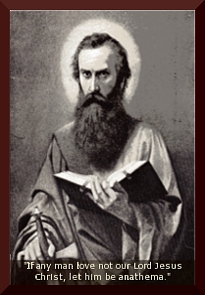In view of the outcry against Bishop Olmsted’s decision to eliminate receiving Communion from the Chalice – and his subsequent reversal – I thought it good to post the traditional teachings of our Faith as to why receiving under two form is not necessary. At the TLM where there is certainly no agitation for receiving under both kinds, we receive the whole Christ under one form, and that is enough for us.
I know of a woman, who with child in arms, went to take from the Chalice. At the moment when the Eucharistic minister offered her the Precious Blood, her child made a grab for the cup, and the sacramental Wine spilled all over her. She told me that she popped the dress into the washer and that was the end of that. No big deal, right?
Communion under the species of Wine should be banned. Bishop Olmsted was right the first time.
THE MANUAL OF THE HOLY CATHOLIC CHURCH:
Q. In what does the Sacrament of Holy Communion, properly speaking, consist?
A. In receiving Jesus Christ, WHOLE AND ENTIRE, HIS SACRED BODY, HIS PRECIOUS BLOOD, HIS BLESSED SOUL, AND HIS ADORABLE DIVINITY, INTO OUR SOULS; who by this Blessed Presence within us, communicates to our souls all those heavenly graces which are the effects of Holy Communion.
Q. So we receive the full and perfect Sacrament under one kind only?
A. Yes; for, as we have seen, Jesus Christ, God made man, his body and blood, his soul and divinity are contained whole and entire, both under the form of bread, and under the form of wine, and is the self same in the one kind as in the other. So that when we receive Holy Communion under the form of bread, we receive Jesus Christ into our souls, whole and entire, a full and perfect Sacrament; when we receive it under the form of wine, we receive the same Jesus Christ whole and entire, the same full and perfect Sacrament; and, though we should receive the Communion under both kinds, at the same time, we would not receive two Christs, nor two different Sacraments; but the same Jesus Christ, as in the former cases, only under two different forms instead of one, and the same Sacrament.
Q. Did not Jesus Christ command all to receive in both kinds?
A. Jesus Christ commands all to receive His body and blood; because this is what the sacrament of Communion essentially requires, and this is perfectly accomplished by receiving in one kind only; but there is no command to be found in the whole scripture for all to receive it in both kinds.
Q. But does not our Savior say, “Except you eat of the flesh of the Son of man, and drink his blood, you shall not have life in you?” And does not this expressly command both eating and drinking; and, therefore, receiving in both kinds, otherwise there is no life for us?
A. This, indeed, expressly commands the receiving both his body and blood; but the stress of the command by no means lies upon the manner of receiving it by the separate actions of eating and drinking; and this is manifestly explained by Himself a little after when He says, “He that eateth me, the same also shall live by me,” John vi. 58; and “he that eateth this bread, shall live forever,” verse 59, where we see that eternal life is promised to the eating alone: Which evidently shows, that, by eating only, we perfectly fulfil the command given in the former text, where both eating and drinking are mentioned, and obtain that same life to our souls which is there spoken of; because, by eating alone, we receive both body and blood.
Q. When He gave the chalice to His Apostles, did He not say, “Drink ye all of this?” Matt. xxvi,27.
A. He did: but who were the all here spoken to? Surely the Apostles who were present with Him, and to whom He was speaking; and accordingly St. Mark tells us, that “they all drank of it,” Mark xiv.23. This, indeed, may imply a command to the priests who actually celebrate the Holy Mysteries, to receive at that time under both kinds, but by no means contains a command for all the people, nor even for the priests, who are not actually celebrating, to do so.
Q. Are there any grounds from scripture to authorize the giving Communion in one kind?
A. There are most manifest grounds in scripture for it: First, Because our Savior Himself assures us, as we have just seen, that Communion in one kind is a full and perfect sacrament, by which eternal life is procured to the souls; “he that eats this bread shall live forever.” Second, Because it is evident from the scripture, that under either kind, we receive Jesus Christ whole and entire, both His body and blood, in which the essence of the sacrament consists.
Third, Because St. Paul says, “whosoever shall eat this bread, or drink the chalice of the Lord unworthily, shall be guilty of the body and blood of our Lord,” 1 Cor.xi 27. Where, by saying, “eat or drink“, he manifestly shows, that it was the practice in his time to do the one or the other, to receive either by eating or drinking. And the force of this text is so strong in favor of Communion in one kind only, that in all ages of the Church it had been accepted as such and practiced.
Fourth, Because our Savior Himself, when He discovered Himself to the two disciples going to Emmaus, communicated to them in one kind only; for, on receiving that divine Bread from His hands, “their eyes were opened, and they knew Him; and He vanished out of their sight,” Luke xxiv. 31. Now, that this was the Holy Communion which He gave them, is clear from the manner in which He gave it to them, which was the same as at the Last Supper, “He took bread, and blessed, and broke and gave it to them,” verse 30. And still more from the effect it produced in them of opening their eyes, that they knew Him, which surely common bread could not do.
Fifth, Because the Apostles themselves followed the same practice, as occasion required, which appears both from the text just now cited from St. Paul, and also of the account given of the first Christians, in the Acts: “And they were persevering in the doctrine of the Apostles, and in the communication of the breaking of bread, and in prayers.” Acts ii. 42
Q. How does the Church look upon this?
A. She considers the giving Communion in one kind only, or in both, merely as a point of discipline, which may be varied according as circumstance may require; and, in consequence of this, she has, on various occasions, sometime given it in one kind, sometimes in both, as is evident from all monuments of antiquity, even from the earliest ages.
Q. But if one kind alone was sufficient for a full and perfect Sacrament, and if our Savior did not intend that all should receive it in both kinds, why did He institute it in both kinds?
[Read carefully. The answer is terribly important for the faithful to understand.]
A. Because this Holy Mystery was ordained not only as a Sacrament, but also as a Sacrifice. Now, though one kind alone be sufficient for a true and perfect Sacrament, yet both kinds are required to make it a Sacrifice; for this reason, because the nature of this holy Sacrifice consists in representing the death of Jesus Christ, and offering Him up to His Eternal Father under the appearance of death, which could not be done but by both kinds,…




